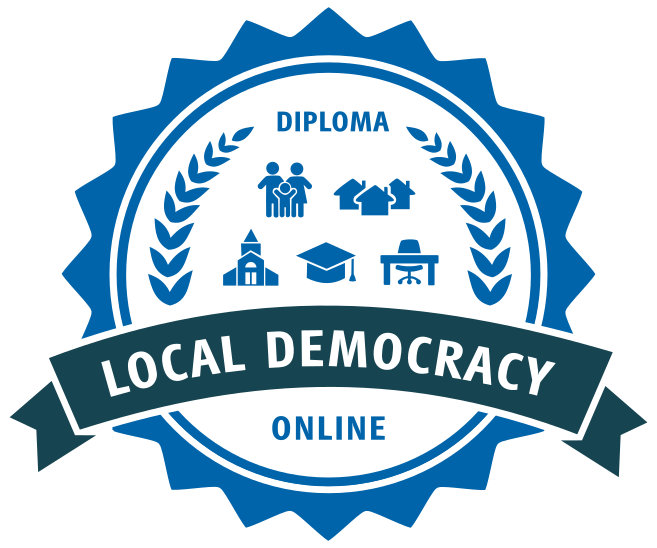
Local Democracy Online explores how democratic relationships in everyday life form the roots of a democratic society. Participants reflect on their own experiences of democracy and think about what it means to include people in the decisions that affect their lives, what practicing reciprocity looks like, and why everyday equality is necessary for a democratic future.
Course Instructions
Welcome to Local Democracy Online!
This online, self-paced format has some elements you should keep in mind, to make your experience as smooth and enjoyable as possible.
The nature of our online platform, while powerful in some ways, is limited in other ways. Here are a few limitations you may notice. We are grateful for your patience as these may make your experience less enjoyable:
As you go through each video and quiz, you will see it is possible to hit “next” without hitting complete. This can be confusing to some people who might miss marking their progress.
It may be confusing that after you submit a quiz, you go back to the screen that says “start quiz.” This makes it feel that your progress wasn’t recorded. This isn’t true. The course admin will go in and mark your quiz as soon as possible.
You also may notice that it’s possible to breeze through the videos without reflecting. This is also due to the structure of the learning platform. You can breeze through the videos, but we encourage you not to do so. Deeper learning will happen through slower engagement.
Additionally, you may go looking for a discussion forum mentioned in the intro but can’t find it. We had recorded the audio first, before creating the videos, and before finalized our choice of learning platforms.
This means that there is no forum per se. Instead we encourage you to use the comments section for the various videos.
Introduction Video
Course Content
Introduction
-
Welcome to Local Democracy Online
05:37 -
Session 1 – Lesson 1 Quiz
-
What Are Democratic Relationships in Everyday Life
05:23 -
Session 1 – Lesson 2 Quiz
Democratic Virtues
-
What Makes Individuals Democratic
05:16 -
Session 2 – Lesson 1
-
Virtues as Moral Habits
00:00 -
Session 2 – Lesson 2 Quiz
-
Virtues, Aims, and Goals
00:00 -
Session 2 – Lesson 3 Quiz
-
Virtue #1 – Listening
00:00 -
Session 2 – Lesson 4 Quiz
-
Virtue #2 – Inclusion
00:00 -
Session 2 – Lesson 5 Quiz
-
Virtue #3 – Personal Responsibility
04:45 -
Session 2 – Lesson 6 Quiz
-
Virtue #4 – Responsible Obedience
06:33 -
Session 2- Lesson 7 Quiz
-
Virtue #5 – Authenticity
00:00 -
Session 2 – Lesson 8 Quiz
-
Virtue #6 – Equalizing
00:00 -
Session 2 – Lesson 9 Quiz
Size and Democracy
-
Introduction to the Decentralist Tradition
00:00 -
Session 3 – Lesson 1 Quiz
-
Right Size in Nature
00:00 -
Session 3 – Lesson 2 Quiz
-
Right Size in Economics
00:00 -
Session 3 – Lesson 3 Quiz
-
Size and Cities
10:46 -
Session 3 – Lesson 4 Quiz
-
Size and Democratic Government
00:00 -
Session 3 – Lesson 5 Quiz
-
Size and Local Democracy
00:00 -
Session 3 – Lesson 6 Quiz
Subsidiarity
-
Nestedness in Society
00:00 -
Session 4 – Lesson 1 Quiz
-
Subsidiarity 101
02:59 -
Session 4 – Lesson 2 Quiz
-
Subsidiarity in Decision-Making
00:00 -
Session 4 – Lesson 3 Quiz
-
Subsidiarity, Dependency, and Empowerment
08:17 -
Session 4 – Lesson 4
-
Subsidiarity and Participatory Democracy
13:02 -
Session 4 – Lesson 5 Quiz
-
Subsidiarity and Local Democracy
00:00 -
Session 4 – Lesson 6 Quiz
Community and Democracy
-
Community – Belonging
08:21 -
Session 5 – Lesson 1 Quiz
-
Community – Competence
00:00 -
Session 5 – Lesson 2 Quiz
-
Community – Democracy
09:54 -
Session 5 – Lesson 3 Quiz
-
Community vs Freedom
00:00 -
Session 5 – Lesson 4 Quiz
-
Lifeworld vs Systemworld
10:29 -
Session 5 – Lesson 5 Quiz
Ratings & Reviews

Course material developed by Isaiah Ritzmann. Course videos developed by JP Smola. Online course created with TutorLMS.
- For more information, contact Isaiah:
- [email protected]
-
Last UpdatedApril 24, 2025
